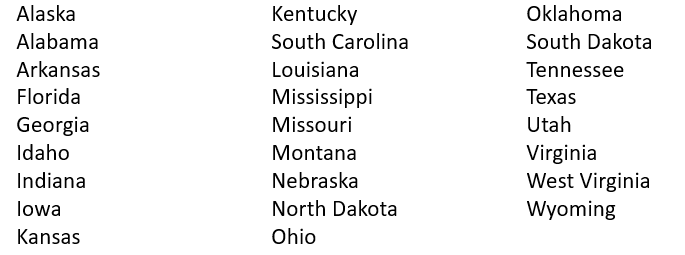26 Jul Update and FAQ on Title IX Legal Challenges
Updated October 1, 2024
As the Pregnant Scholar team recently reported, the Department of Education’s 2024 Title IX rules have been the subject of ongoing litigation. Due to these legal challenges, courts have temporarily blocked the federal government from enforcing the new Title IX regulations in 26 states and hundreds of schools. This article addresses frequently asked questions about the injunctions and other challenges to the new Title IX rules.
Dowload our pdf fact sheet on the challenges, created in collaboration with the ACLU, National Womens Law Center, A Better Balance, and Public Justice:
What is an “injunction”?
Lawsuits in the U.S. can take a long time to be decided—from months to years. A preliminary injunction is a court’s way of preventing harm or preserving the status quo while a lawsuit is still in progress. Several federal judges have put in place these injunctions to block the federal government from implementing and enforcing the new Title IX rule while the court decides on the full case. One federal court has also enacted an “administrative injunction,” which is another temporary hold, and is currenltly being debated in court.
Which educational institutions are impacted by the temporary injunctions?
Educational institutions in 26 states are covered by injunctions, as of August 1, 2024. In addition, several organizations have joined in the lawsuits, asking courts to block the enforcement of the new rules at any educational institution that their members (or their member’s children) attend. The inclusion of these organizations means that the federal government will not be able to enforce the Title IX regulations in over a thousand K-12 schools (list 1, list 2) and hundreds of colleges and universities (list 1, list 2) in states across the nation. What’s more, a federal judge has allowed these organizations to continue to add to the list of schools as they recruit new members; the list of impacted educational institutions may grow in the coming weeks.
Statewide injunctions bar federal enforcement of the Title IX rule in these states:

When do the injunctions go into effect and how long will they last?
The Title IX rule was slated to go into effect August 1, 2024. At that time, the Department of Education will begin investigating potential discrimination based on the standards in the new Title IX rule. This start date has been put on hold indefinitley for schools covered by a preliminary injunction. On August 16, 2024 the Supreme Court rejected a Biden Administration request to narrow the scope of some injunctions, leaving the injunctions to continue indefinitley. (See our statement about the decision, here.)
What concerns do the lawsuits address?
The lawsuits have been brought by conservative politicians and organizations and focus primarily on the new Title IX regulations’ protections related to gender identity. Litigants in two cases have also raised concerns about the rule protecting students who have had abortions; a requirement that has been in place since the very first Title IX regulations were issued in 1975. (Note, Title IX expressly prohibits requiring educational institutions to provide or pay for abortions, and also offers exemptions for religious institutions who find that complying with the law would violate their religious beliefs.)
Can institutions under an injunction implement changes re: pregnant and postpartum students?
Yes! We urge campuses to continue to apply the standards expressed in the 2024 implementing regulations relating to the accommodation of pregnant and postpartum students. The federal injunctions do not bar educational institutions from following the new Title IX regulations.
The court orders specifically bar federal government officials from enforcing the new regulations, but do not prevent individual institutions from moving forward.
Title IX itself remains federal law. The regulations offering the Department of Education’s updated interpretation of Title IX have been put on hold, but Title IX itself still stands and can be used by students to bring lawsuits. Additionally, in states/schools with injunctions, the Department of Education will continue to enforce the 2020 regulations. As such, educational institutions that discriminate against pregnant or parenting students risk liability. While the injunction may limit someone’s ability to bring a case regarding the more nuanced provisions of the new regulations (e.g. notification standards or investigation standards), students have and will continue to sue for failure to accommodate, provide leave, and harassment or exclusion on the basis of pregnancy and related conditions. The new Title IX rule implements pregnancy accommodation best practices and can be a useful guide for educational institutions to avoid liability, comply with the 2020 Title IX regulations (where applicable), and better support pregnant and postpartum students. And, of course, providing that support is critical for retaining students and advancing equity on campus and in our communities.
Finally, please recall that the injunction can be lifted at any time. Educational institutions will have short notice of changes, and would be wise to prepare now.
Please note: while educational insitutions can implement the 2024 provisions specific to pregnant and parenting students, there are other areas of the regulations where the 2024 and 2020 regulations may conflict. Our reccommendation to apply the 2024 rules applies only to the provisions specific to pregnant and parenting students.
What is my state AG has instructed schools to not comply with Title IX?
Several state attorneys general have issued opinions that schools should not comply with the new Title IX rules. While this does not excuse educational institutions from the requirements of federal law, it can certainly complicate the on-campus dynamics. Several campus leaders have already reported to our team that they would like to implement changes to comply with the new regulations but are nervous about facing retaliation if they do. It is important to note that most of the “do not comply” statements were focused on the new rule’s protections related to the rights of LGBTQ students. These orders may violate federal law; remember, Title IX itself and the 2020 regulations continue to apply, even in states under injunctions and do not comply statements. Consider asking your campus leadership about the changes you would like to implement.
As you have your conversation, remember:
- Support for pregnant and postpartum students is non-partisan! Political leaders at every level have supported strengthening protections for this student population, and changes to improve accommodation processes are unlikely to be controversial.
- The pre-existing Title IX standards included making accommodations on the basis of pregnancy and related conditions, though much of how this was to be accomplished was previously unclear. Steps to improve your campus accommodation process can be considered steps to improve the functioning of these pre-existing standards. For example, a Title IX standard operating procedure informing students of their rights to accommodations and leave has long been a best practice; there is no reason to stop doing so just because it is a small part of this federal regulation.
- Protecting lactating students was required by law before the 2024 Title IX regulations. As articulated in our previous posts on the topic, lactation is well-accepted as a sex-linked condition, and as such, meeting the needs of lactating students would not be an action taken solely to comply with the new regulations. Moreover, academic institutions also have new legal requirements to provide lactation breaks and space for employees sunder the PUMP Act and Pregnant Workers Fairness Act. These laws significantly increased the number of people entitled to lactation spaces, and justify increasing the number of lactation spaces on campus regardless of Title IX.
What is Congress doing about Title IX?
Conservative lawmakers are also bringing challenges to the Title IX regulations in Congress. In June, the House of Representatives voted to reject the new regulations. The bill is expected to be voted on in the Senate very soon. While this vote is extremely important, it is expected that President Biden would veto a bill rejecting the Title IX regulations.
How can we help protect Title IX?
Campus administrators, students, and community allies can help by raising awareness about the tremendous impact the new Title IX regulations would have in the lives of pregnant and postpartum students and their families. We’re grateful that some direct service providers have recently done so amicus “friend of the court” briefs. As these briefs highlight, the changes brought by the 2024 Title IX rule are critical for the health, wellbeing, and economic security of pregnant and postpartum students. Please consider joining the effort by reaching out to your administration, local press, and elected officials to remind them of the urgency of protecting students under Title IX.
Students, administrators and others with questions regarding the new Title IX Regulations should review our 2024 Title IX Toolkit, or contact us for more information.




